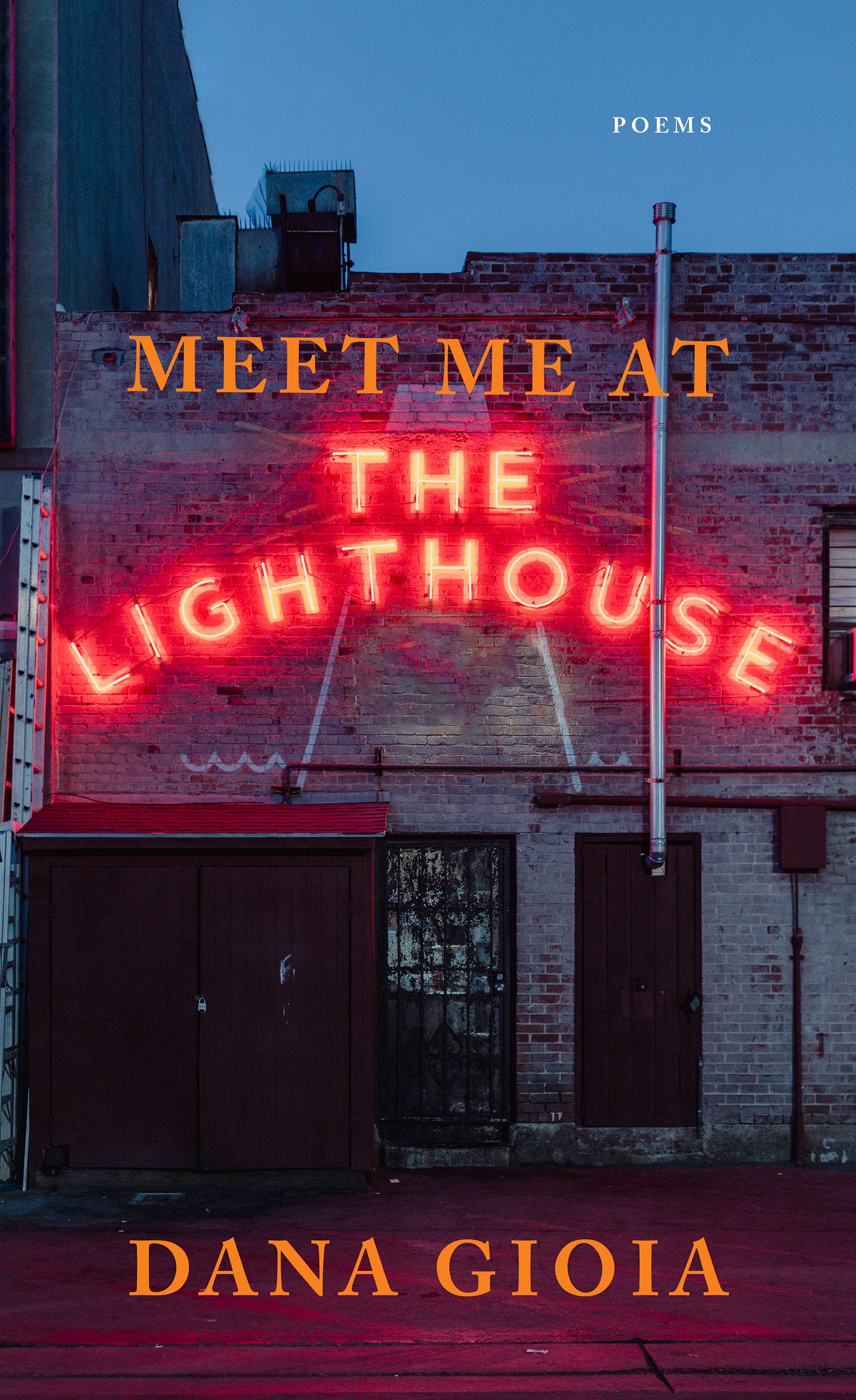Meet me at the Lighthouse
Dana Gioia, Richard Hugo, and the poetry of place
Dana Gioia’s new collection Meet Me At The Lighthouse has wonderful range: traditional lyric poems, songs, translations, epitaphs, ballards. So much scope in only seventy pages. Who else can go from Rilke to cabaret like that? Variety is sometimes thought of as less prestigious—what, after all, is a variety show if it isn’t low brow? But one of the things that marks out a great writer is their ability to work in different forms and modes. Perhaps the best collection of poetry from the twentieth century was Another Time, in which Auden showed his mastery of dozens of poetic forms, ranging from a eulogy to Freud to music hall lyrics. T.S. Eliot couldn’t quite do that, but even the arch high-brow himself produced Old Possum, and bloody good it is too. Gioia has that versatility. Each piece has his trademark precision, learned in part from the time he spent studying with Elizabeth Bishop. (I am a fan of his memoir about Bishop. My review here.)
By far my favourite poem in this collection is The Underworld, which is one of Gioia’s best. The first line is straight out of Bishop, intentionally or otherwise, and there are many other influences. The poem is also a catalogue of writing techniques. This is no medley or ensemble though: Gioia creates unity from variety. The carefully measured blank verse (there are some internal and partial rhymes) gives this poem the integrity of a decorated vase, whose images present a panorama of a journey to hell.
The question should be asked—why have you come?
Why willingly depart the rain, the stars,
The gold abundance of the morning sky,
The dusty ripeness of the apple bough?
The question should be asked—but no one speaks.
The train jogs forward through the dark. You learn
No one will stop you on the journey down.
This sort of writing has the light and dark, the careful touch, and the joyous immersive observation of a writer like Seamus Heaney. When he stretches out like this, Gioia sounds more like Robert Frost. But always, always, he is a poet of the West Coast.
The train emerges to lowland plain
Bordered by mountains on either side.
Behind each range another range arises,
Higher and curving inward like a dome—
Repeat those lines to yourself. Higher and curving inward like a dome has the propulsive resistance of something like this from Wordsworth: My boat went heaving through the water like a swan. What skill, to give a heavy line such rhythm. Kipling could do that with long lines about trains as well, and the inevitable small pause between ‘curving’ and ‘inward’ is similar to the way an alexandrine (or a longer line) might work. Isn’t that exactly how you do feel when a train emerges from a tunnel to a low landscape, suddenly more ponderous, but just as rhythmic? The weight of this line and its slowness enhances the sense of a dome of mountains rising up around you.
Can you hear the phrase curving inward like a dome without remembering ‘Birches’: You’d think the inner dome of heaven had fallen. Like Frost, Gioia gets a lot of his music from iambs, but you see in these four lines how carefully he can introduced choriambs to the start of lines and switch to trochaic meter. This kind of precision is how you end up writing jazz lyrics, too. You can hear some of the jazz lyrics being sung in a recent piece by his brother the music critic Ted.
Ted Gioia also wrote about the time Dana turned up to a class at Stanford with Ezra Pound’s daughter. Another of my favourite Gioia poems is ‘Cuckoos’, which he wrote about a trip to Italy when he visited Pound. Some of Gioia’s most well-known poems are about LA and California. Put all that together with the Underworld and he becomes, like another great West Coast poet Richard Hugo, a writer of place. Read Argo and you might detect some influence, or at least a shared tradition between these two poets.
A doggy mile-long freight pulls out
Certain of clear track and ample siding.
Doves are scattered and the kite is down
And the fires lost in dawn.
Is it so obvious which of the two of them wrote that? Clearly it is Hugo, but you can feel the shared sensibility. The fires lost in dawn. All through The Underworld I feel the presence of Richard Hugo, who wrote:
Perhaps the dead
Trade places underground.
To write like this you need to be a traveller, as Gioia is and Hugo was; you also need the imagination and careful technique that is on display throughout this book. Unlike so many others today, Dana Gioia writes for the common reader, firmly rooted in tradition, and is readable because of his complex technique.
Thanks for reading. If you’re enjoying The Common Reader, let your interesting friends know what you think. Or leave a comment.
If you don’t subscribe to The Common Reader, but you enjoy reading whatever’s interesting, whenever it was written, sign up now.


